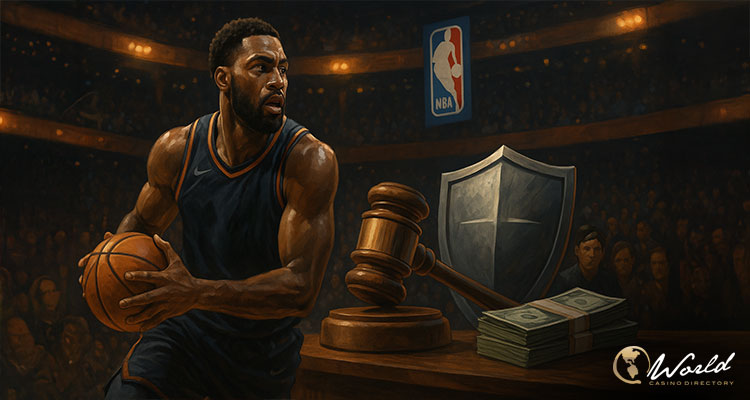The NBA and the National Basketball Players Association (NBPA) are uniting in support of stricter limitations on proposition betting, a move driven by mounting concerns over game integrity and harassment of athletes. Following multiple gambling scandals that shook the league, officials from both organizations say new restrictions are necessary to protect players and restore trust.
The issue reached a boiling point in April 2024 when commissioner Adam Silver issued a lifetime ban to former Toronto Raptors forward Jontay Porter. The league determined that Porter had deliberately manipulated his own performance in two games while on a two-way contract, allowing associates to profit from bets on his statistical unders.
Porter later admitted guilt in federal court, pleading to conspiracy charges and acknowledging he intentionally withdrew from games during the 2023-24 season to benefit gamblers connected to him. His sentencing is scheduled for December 2025. Alongside Porter, five others have been arrested in the same investigation, with four already pleading guilty to wire fraud conspiracy charges.
The fallout led the NBA to immediately request its sportsbook partners to remove betting markets that allowed unders on players with two-way contracts, like Porter. Now, league officials believe more sweeping restrictions may be needed.
“Protecting the integrity of our game is paramount, and we believe reasonable limitations on certain prop bets should be given due consideration,” an NBA spokesperson told ESPN. “Any approach should aim to reduce the risk of performance manipulation while ensuring that fans who wish to place prop bets can continue to do so via legal, regulated markets.”
Harassment of Players Sparks Union Support
While the NBPA considers the Porter case an isolated event in terms of actual game-fixing, it has emphasized the damaging impact of player-focused betting on athletes’ safety and well-being. According to the union, disgruntled gamblers have increasingly targeted players both online and in person, creating a hostile environment tied directly to prop betting markets.
“NBA players compete at the highest level with the utmost integrity and are concerned that prop bets have become an increasingly alarming source of player harassment, both online and in person,” an NBPA spokesperson said. “If tighter regulations can help minimize that abuse, then we support taking a closer look at them.”
Players Terry Rozier and Malik Beasley have also been connected to the ongoing federal investigation, though neither has been charged. Rozier faced scrutiny after a 2023 game with the Charlotte Hornets drew suspicious betting activity, while Beasley, currently a free agent, was investigated for alleged manipulation of player props. The NBA has said it found no evidence of violations in Rozier’s case.
Wider Push for Prop Bet Restrictions Across Sports
The debate around microbets and player props extends beyond the NBA. State leaders and other professional sports leagues are also grappling with the risks associated with in-game wagers on narrow events such as a single pitch or basket.
In Ohio, Gov. Mike DeWine pressed for a ban on microbets after two Cleveland Guardians pitchers were sidelined while Major League Baseball investigated unusual betting patterns tied to individual pitches. DeWine urged professional leagues and players’ associations to support stronger restrictions.
New Jersey lawmakers are taking a similar approach. Assembly member Dan Hutchison introduced a bill to eliminate microbetting altogether, arguing, “I just think it’s going too far. We’re going to corrupt our youth as well as corrupt the integrity of the sport.”
The NCAA has already taken action by lobbying states to eliminate prop bets on college athletes, a measure adopted by Maryland, Ohio, Vermont, and Louisiana earlier in 2024.
A Turning Point for the NBA and Betting Partnerships
Legalized sports betting has been a growing revenue stream since its expansion in the United States seven years ago, and the NBA has been among the most active leagues in forging partnerships with sportsbooks. However, the Porter case and the subsequent investigations into other players have revealed the vulnerabilities associated with prop wagers.
League officials acknowledge that while most betting activity is legitimate, markets tied to highly specific player outcomes can be manipulated and increase the likelihood of harassment. For this reason, the NBA and NBPA are now aligned on the need to recalibrate their approach.
The coming months may bring concrete policy changes at both league and state levels, including bans or reductions in certain prop betting markets. Whether fans, who have increasingly engaged with microbets as part of the viewing experience, will welcome or resist those restrictions remains to be seen.
For now, the NBA’s stance is clear: safeguarding integrity and protecting its athletes outweigh the financial upside of unrestricted prop betting. As the league and its players chart a new course, they signal a firm message that bets threatening fairness or player well-being will not be tolerated.


